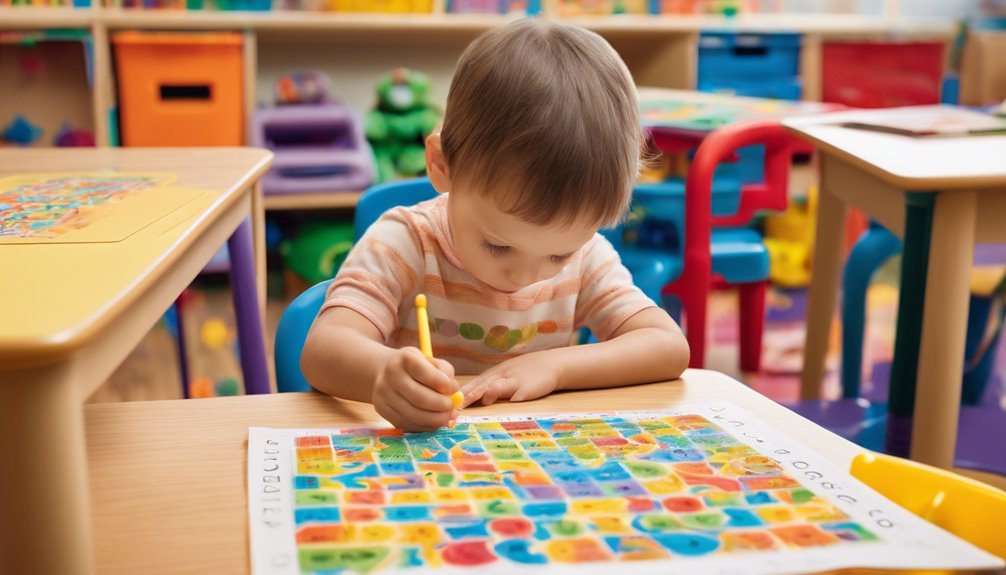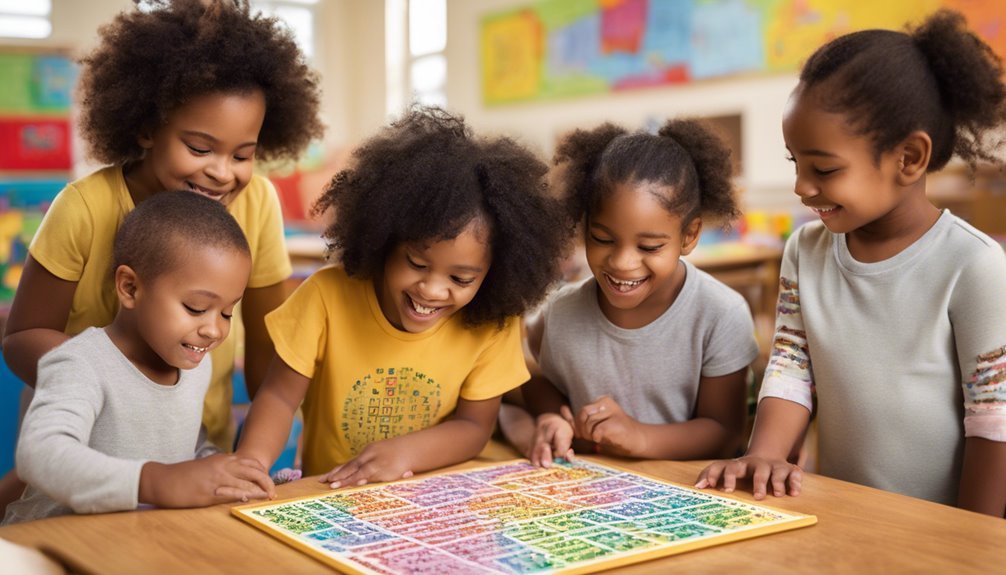"Cherishing Little Steps - A Haven for Baby and Family Journeys"
Why Word Search Puzzles Are Great for Preschool Brain Development
Think of a word search puzzle as a treasure map, guiding preschoolers through the rich landscape of language. These puzzles not only introduce new vocabulary but also enhance critical thinking and concentration skills. As children navigate the letters, they develop problem-solving abilities and foster social interactions with peers. The benefits extend beyond mere entertainment, laying a solid foundation for future learning. What other skills can these simple puzzles unlock?
Key Takeaways
- Word search puzzles enhance vocabulary skills, introducing new terms in a playful context that aids retention and understanding.
- Engaging with puzzles sharpens visual perception and pattern recognition, crucial for literacy and cognitive mapping abilities.
- They improve concentration and focus by teaching children to filter distractions and persist through challenges.
- Navigating puzzles develops problem-solving skills, encouraging critical thinking and strategic planning in overcoming obstacles.
- Word searches foster social interaction and collaboration, building teamwork skills and meaningful connections among preschoolers.
Enhancing Vocabulary Skills
Word search puzzles are a fun and engaging way to enhance vocabulary skills in preschoolers. When you introduce these puzzles, you're not just providing entertainment; you're actively supporting their vocabulary expansion and language acquisition.
As they search for words, kids encounter new terms in a playful context, making it easier for them to remember and use these words later. This interactive approach reinforces their understanding while boosting confidence in their language abilities.
You'll notice how their excitement grows as they connect letters and words, often sparking curiosity about meanings. By integrating word searches into playtime, you're nurturing a love for language that lays a strong foundation for future learning.
It's a simple yet powerful tool in their developmental journey.
Developing Pattern Recognition
Many parents often overlook the importance of pattern recognition in early childhood development, yet it's a vital skill that helps preschoolers make sense of the world around them.
Engaging in word search puzzles sharpens their visual perception, allowing them to identify and differentiate between shapes, letters, and words. As your child searches for hidden words, they're also enhancing their cognitive mapping abilities, connecting information and visual cues.
This skill not only aids in literacy but also fosters critical thinking and problem-solving. By recognizing patterns, children build a foundation for future learning, like mathematics and science.
Improving Concentration and Focus

As children immerse themselves in word search puzzles, they naturally enhance their concentration and focus. These engaging activities serve as effective mindfulness techniques, providing a fun way to practice attention exercises. As they search for words, kids learn to filter out distractions and concentrate on specific tasks, sharpening their cognitive skills.
| Benefits | Mindfulness Techniques | Attention Exercises |
|---|---|---|
| Boosts focus | Deep breathing | Setting small goals |
| Enhances patience | Visualizing success | Tracking progress |
| Encourages persistence | Positive affirmations | Timed challenges |
Encouraging Problem-Solving Abilities
While navigating through word search puzzles, children actively engage their problem-solving skills, a crucial component of cognitive development.
These puzzles present cognitive challenges that require kids to think critically and strategically. As they search for hidden words, they learn to analyze patterns and make connections, honing their critical thinking abilities.
You'll notice your child developing persistence, as they encounter obstacles and find creative ways to overcome them. This process not only builds confidence but also enhances their capacity to tackle everyday challenges.
Fostering Social Interaction and Collaboration

Word search puzzles not only sharpen problem-solving skills but also provide a great opportunity for social interaction and collaboration among preschoolers.
When children work together on these puzzles, they're developing essential teamwork skills. They learn to share ideas, listen to one another, and celebrate small victories together. This collaboration encourages communication development as they express their thoughts and strategies.
As they discuss which words to find or how to approach the puzzle, they build meaningful connections with their peers. These interactions create a supportive environment where preschoolers feel valued, fostering a sense of belonging.
Ultimately, engaging in word search puzzles nurtures not just cognitive abilities, but also the social skills vital for their growth and future relationships.
Making Learning Fun and Engaging
Engaging preschoolers in learning activities like word search puzzles can transform education from a routine task into an enjoyable experience. By incorporating interactive activities, you create a space where playful learning thrives.
Imagine your little one:
- Excitedly spotting words among colorful letters
- Sharing giggles as they race against friends
- Celebrating each found word like a treasure discovered
- Building confidence with every completed puzzle
These joyful moments not only enhance cognitive skills but also foster a love for learning.
Research shows that when children find joy in educational tasks, they're more likely to retain information and develop strong problem-solving abilities. By making learning fun and engaging, you're setting the stage for a lifetime of curiosity and exploration.
Frequently Asked Questions
What Age Is Appropriate for Introducing Word Search Puzzles to Preschoolers?
You can start introducing word search puzzles to preschoolers around ages four to five. They'll enjoy the fun while benefiting from improved vocabulary and cognitive skills, making word searches a delightful addition to preschool learning!
How Can Parents Support Their Child's Word Search Activities at Home?
You can support your child's word search activities by engaging in parent involvement. Try different puzzle variations together, making it fun. Celebrate their progress, and encourage discussions about the words, enhancing their learning experience.
Are There Specific Themes for Word Searches That Benefit Preschool Learning?
Absolutely! Using animal themes and color themes in word searches can enhance your preschooler's learning. These engaging topics not only spark interest but also help reinforce vocabulary and promote cognitive skills through fun, interactive exploration.
Can Digital Word Search Apps Be Effective for Preschool Brain Development?
Digital word search apps can boost your preschooler's cognitive skills through interactive play. They promote digital engagement, making learning fun and dynamic. You'll see your child's problem-solving and vocabulary skills grow with every puzzle they tackle.
How Often Should Preschoolers Engage With Word Search Puzzles for Best Results?
Think of word search puzzles as daily brain snacks. For best results, aim for daily engagement, following frequency guidelines that suggest 15-20 minutes each day. This consistent practice nurtures your preschooler's cognitive growth and enjoyment.
Conclusion
Incorporating word search puzzles into your preschooler's routine isn't just a fun pastime; it's a brain-boosting workout. By enhancing vocabulary, improving concentration, and fostering social skills, these puzzles lay a strong foundation for future learning. Just like ancient scholars used cryptic texts to sharpen their minds, today's children can navigate these engaging challenges to develop critical thinking. So, let your little ones dive into the world of word searches—it's a playful way to nurture their growing brains!

